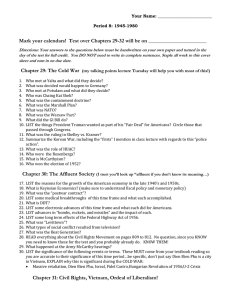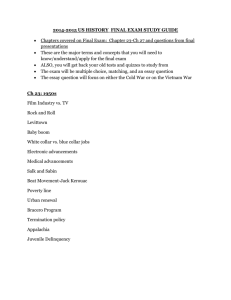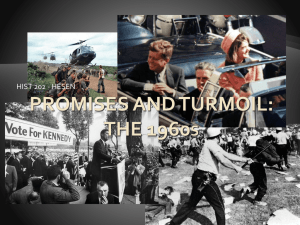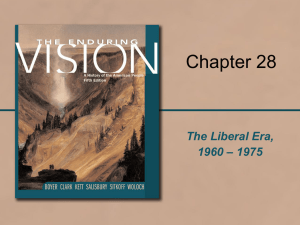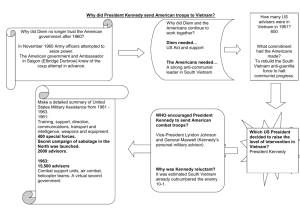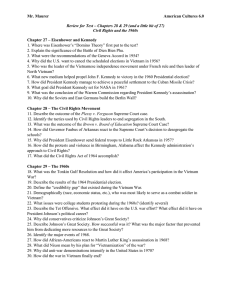The American Paradox Search for an Identity
advertisement
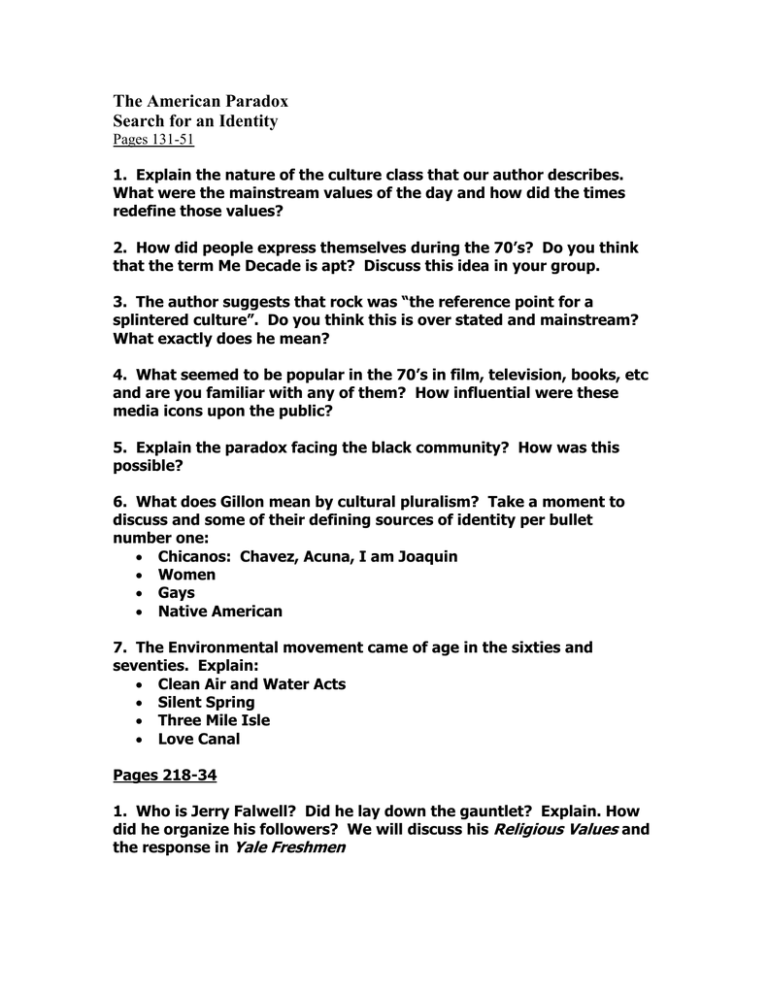
The American Paradox Search for an Identity Pages 131-51 1. Explain the nature of the culture class that our author describes. What were the mainstream values of the day and how did the times redefine those values? 2. How did people express themselves during the 70’s? Do you think that the term Me Decade is apt? Discuss this idea in your group. 3. The author suggests that rock was “the reference point for a splintered culture”. Do you think this is over stated and mainstream? What exactly does he mean? 4. What seemed to be popular in the 70’s in film, television, books, etc and are you familiar with any of them? How influential were these media icons upon the public? 5. Explain the paradox facing the black community? How was this possible? 6. What does Gillon mean by cultural pluralism? Take a moment to discuss and some of their defining sources of identity per bullet number one: Chicanos: Chavez, Acuna, I am Joaquin Women Gays Native American 7. The Environmental movement came of age in the sixties and seventies. Explain: Clean Air and Water Acts Silent Spring Three Mile Isle Love Canal Pages 218-34 1. Who is Jerry Falwell? Did he lay down the gauntlet? Explain. How did he organize his followers? We will discuss his Religious Values and the response in Yale Freshmen 2. There are some key issues in the continuing struggle between fundamentalism or traditionalists & their opponents. What are the key issues, sources of contention & status of that struggle today? 3. How did Ryan White explode the AIDS myth? Did the battle field shift? 4. Do you think that the antagonists have used the courts effectively in their battles? The Kennedy Presidency 1. The assassination of JFK saw a spiraling decline by the U.S. public concerning leadership and ensuing “credibility gap”. How have times changed? 2. What were the promises of the New Frontier? Outline the issues and the programs. 3. Do you think JFK was an activist and a civil rights leader? How did the president respond to events like the Freedom Rides and Birmingham? 4. Discuss the rhetoric of Kennedy concerning the Cold War. Where did reality meet with rhetoric concerning Cuba and Berlin? What were the stakes in the Missile Crisis? 5. How did President Kennedy respond to events in Vietnam? What steps were taken to limit Vietcong advances? Do you see any similarities to the situation in Iraq today? 6. Some say that the Warren Commission rushed to judgment? Do you agree or disagree Johnson’s Ordeal: The Great Society and Vietnam. 1. What are the paradoxes illustrated by Vietnam and the Great Society? 2. How did LBJ utilize the legacy of JFK in conducting his War on Poverty? Could the richest nation under the sun eliminate poverty or was it a cruel hoax? Assess the programs and outcomes. 3. What was the appeal of Barry Goldwater to conservatives? What was his message in his acceptance speech? Did Goldwater win the debate in the long run? Explain. 4. The Great Society sought to advance the New Deal of FDR. What measures were continuations of FDR’s legacy and what was new about LBJ’s Great Society? 5. Coalitions contributed to the success of the civil rights movement. How did the consensus and coalition unravel and why? Why was 1964 a watershed year? 6. President Johnson stumbled deeply into the quagmire of Vietnam. What were the milestones that led to the Tet Offensive? Why did it take so long for people to realize the misdirected and distorted logic of the troop surge in Vietnam? 7. Why did it take so long for soldiers to recognize the injustice of the war? How did they realize that they were being misled? Challenging the Consensus, 1960-69 1. Amidst the nation’s youth, describe the various voices of protest or resistance to mainstream values: hippies, beats, etc. What was the message found in the music and the deeds of this generation of Americans? Was the message one of unity? Explain. 2. What is the message of the Port Huron Statement? Can you relate? Why or why not? How do you explain the frustration of the New Left & how did they differ with those you described as hippies, beats, etc. What role did the war in Nam play in dividing youth? Challenging Consensus, Continued 3. Who were the conservatives and their message? Contrast the message of The Sharon Statement with that of Port Huron. Do you identify with either camp? Which and Why? 4. The long hot summers, 1964-68, exposed another paradox in American life. This one concerned the civil rights movement. How far had the nation moved forward before the experience of the white backlash? Discuss Dr. King’s strategy in Chicago and outcome and how that spoke to the so-called backlash. 5. What was the message of the “Black Power” movement and their goals? Assess Malcolm X’s speech on The Black Revolution and note whether you think there was room for the two sides, Dr. King and Malcolm, to meet and join forces? 6. Who were the Black Panthers and their message? How did the establishment respond to their activities? Do you think the radical voices of Black Power stalled the civil rights movement? Explain. 7. Americans supported the war in Vietnam through 1967. What event(s) led to a waning of that support and why? Robert Kennedy claimed that the nation was in the midst of the greatest domestic crisis since the Civil War? What did he mean and do you agree? 8. What happened to LBJ’s presidency in 1968 and how did his demise relate to events in Vietnam? Discuss how Dr. King, Robert Kennedy, Walter Cronkite and Eugene McCarthy all hammered in nails into the president’s political coffin. 9. Robert Kennedy asked the question before his death: How do you seek to change a society that yields so painfully to change?” How do you? Why are we so reluctant to change and so willing to stand against our own best interests? 10. Discuss the election campaigning of 1968 and the eventual outcome. What did the public want in that year? . Richard Nixon and The New Republican Majority 1. Discuss the rise of Richard Nixon and how he tapped into the fears of the nation. What did he mean by the silent majority and how did he harness their support? 2. Nixon promised “peace with honor’ in Vietnam. What policy did he pursue in ending the war and discuss the role of his advisor, Henry Kissenger? Did the U.S. end the war with our goals in tact and discuss the lessons learned from Vietnam? 3. How did Nixon approach the Cold War paradigm and break with past precedents? Do you see tangible achievements attained in that policy? Explain. 4. Richard Nixon was an enigma and paradox to many, perhaps including himself. Trace the events that led to Watergate and assess Nixon’s response to the events reflected his personality. How might he have responded to save his presidency? Final Exam Your task is to write two essays from the choices given below. These are type written essays that are proofread and critical assessments. You must address two questions, each at 25 points. You may elect to respond to a third question for an additional ten bonus points. You have only the choice concerning Robert Kennedy’s question. 1. Discuss the rhetoric of Kennedy concerning the Cold War. Where did reality meet with rhetoric concerning Cuba and Berlin? What were the stakes in the Missile Crisis? 2. The Great Society sought to advance the New Deal of FDR. What measures were continuations of FDR’s legacy and what was new about LBJ’s Great Society? 3. Describe the various voices of protest or resistance, amongst the American Youth, to mainstream values : hippies, beats, etc. What was the message found in the music and the deeds of this generation of Americans? Was the message one of unity? Explain. 4. What was the message of the “Black Power” movement and their goals? Assess Malcolm X’s speech on The Black Revolution and note whether you think there was room for the two sides, Dr. King and Malcolm, to meet and join forces? The Bonus Robert Kennedy asked the question before his death: How do you seek to change a society that yields so painfully to change?” How do you? Why are we so reluctant as a nation to change and so willing to accept the status quo?
